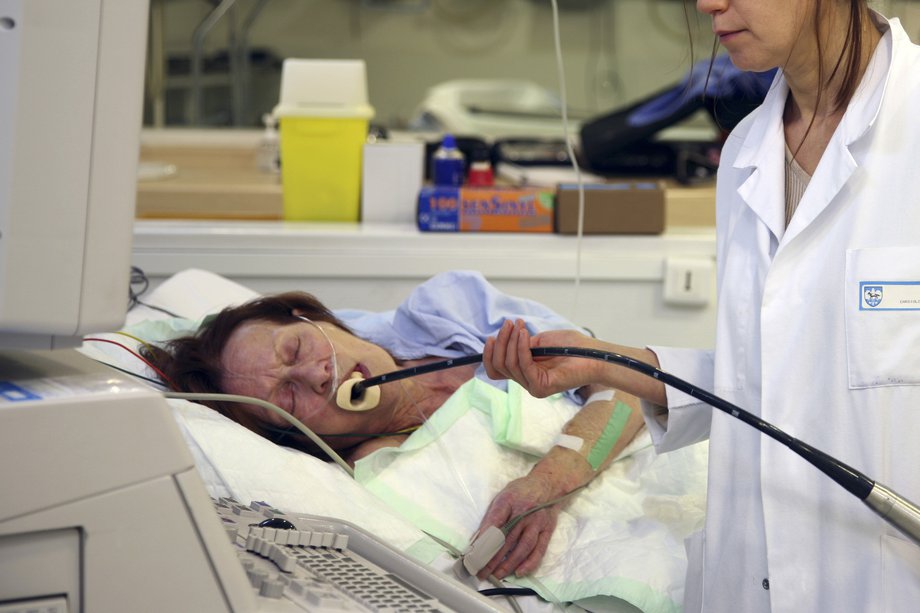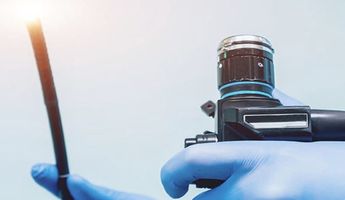Endoscopic Ultrasound (EUS) in Switzerland
Find the best clinics for Endoscopic Ultrasound (EUS) in Switzerland
No clinics available

WHY US?
At Medijump, we're making medical easy. You can search, compare, discuss, and book your medical all in one place. We open the door to the best medical providers worldwide, saving you time and energy along the way, and it's all for FREE, no hidden fees, and no price markups guaranteed. So what are you waiting for?

Free

Best Price

Widest Selection

Risk-Free
What you need to know about Endoscopic Ultrasound (EUS) in Switzerland

Endoscopic ultrasound (EUS) is a procedure that allows your doctor to attain information and images of your digestive tract as well as the surrounding tissues and organs. It is used to assess gastrointestinal and lung disease. Endoscopic ultrasound can help in the evaluation of lymphoma, bile duct stones, pancreatic cysts, neuroendocrine tumors, as well as cancer of the esophagus, lung, colon, stomach, pancreas, rectal, and ampullary.
What does a Endoscopic Ultrasound (EUS) Procedure Involve?
During an endoscopic ultrasound, you may be given sedation and anesthetic to help you relax. Then, your doctor will insert an endoscope with a small ultrasound device installed on its tip into your digestive tract. An endoscope is a tiny, flexible tube that has a light and camera attached to its end. The ultrasound will provide more detailed and accurate images than traditional ultrasound.
How Long Should I Stay in Switzerland for a Endoscopic Ultrasound (EUS) Procedure?
Endoscopic ultrasound is an outpatient procedure, meaning you can leave the hospital immediately after the procedure. However, you will need to stay in Switzerland for around 7 to 8 days because the detailed results normally take about a week before they are available.
What's the Recovery Time for Endoscopic Ultrasound (EUS) Procedures in Switzerland?
You will be monitored for about an hour after the procedure. You will be advised to take it easy for the rest of the day. Unless the result shows that you have a serious medical condition, you will be able to get back to your normal routine within a day or two.
What sort of Aftercare is Required for Endoscopic Ultrasound (EUS) Procedures in Switzerland?
Within the first hour after the procedure, you will only be allowed to drink water. It may take a little longer until you can eat food. There is no special diet or exercise you need to do, except if the result shows that you have a medical condition. You may need a follow-up visit with your local doctor to go over the results.
What's the Success Rate of Endoscopic Ultrasound (EUS) Procedures in Switzerland?
Several studies show that the rate of complications after an endoscopic ultrasound is very low, meaning it is a very safe procedure. The risks and side effects may include infection and bleeding, but that is very rare.
Are there Alternatives to Endoscopic Ultrasound (EUS) Procedures in Switzerland?
Since endoscopic ultrasound gives unique and accurate information, there are no real alternatives to this procedure. However, if you do not want to undergo this procedure or if the procedure results in misdiagnosis, traditional ultrasound or X-ray can be an option.
What Should You Expect Before and After the Procedure
Before an endoscopic ultrasound, your doctor may not be able to confirm their diagnosis of your condition. After the procedure, your doctor is provided with precise information regarding your digestive tract, which allows them to evaluate and consider the treatment options for your case.
Whilst the information presented here has been accurately sourced and verified by a medical professional for its accuracy, it is still advised to consult with your doctor before pursuing a medical treatment at one of the listed medical providers
No Time?
Tell us what you're looking for and we'll reachout to the top clinics all at once
Enquire Now

Popular Procedures in Switzerland
Prices Start From $614

Endoscopic Retrograde Cholangiopancreatography (ERCP)
Prices Start From $614
See prices & compare resultsPrices Start From $131

Prices Start From $47

Recommended Medical Centers in Switzerland for procedures similar to Endoscopic Ultrasound (EUS)

- Interpreter services
- Translation service
- Religious facilities
- Medical records transfer
- Medical travel insurance
- Health insurance coordination
- TV in the room
- Safe in the room
- Phone in the room
- Private rooms for patients available

- Interpreter services
- Translation service
- Religious facilities
- Medical records transfer
- Medical travel insurance
- Health insurance coordination
- TV in the room
- Safe in the room
- Phone in the room
- Private rooms for patients available

- Interpreter services
- Translation service
- Religious facilities
- Medical records transfer
- Medical travel insurance
- Health insurance coordination
- TV in the room
- Safe in the room
- Phone in the room
- Private rooms for patients available

- Interpreter services
- Translation service
- Religious facilities
- Medical records transfer
- Medical travel insurance
- Health insurance coordination
- TV in the room
- Safe in the room
- Phone in the room
- Private rooms for patients available

- Interpreter services
- Translation service
- Religious facilities
- Medical records transfer
- Medical travel insurance
- Health insurance coordination
- TV in the room
- Safe in the room
- Phone in the room
- Private rooms for patients available

- Interpreter services
- Translation service
- Religious facilities
- Medical records transfer
- Medical travel insurance
- Health insurance coordination
- TV in the room
- Safe in the room
- Phone in the room
- Private rooms for patients available

- Interpreter services
- Translation service
- Religious facilities
- Medical records transfer
- Medical travel insurance
- Health insurance coordination
- TV in the room
- Safe in the room
- Phone in the room
- Private rooms for patients available

- Interpreter services
- Translation service
- Religious facilities
- Medical records transfer
- Medical travel insurance
- Health insurance coordination
- TV in the room
- Safe in the room
- Phone in the room
- Private rooms for patients available
